An RN named Kelly Jantz loves being a nurse, and loves making people laugh.
Once a week, she shows up at her hospital in a vintage nursing uniform, wheeling her cart full of supplies. No hypodermic needles here — it’s all the likes of stuffed animals, comic DVDs, and clown noses. These supplies are used for laugh therapy with staff members, patients, and their families.
She’s dubbed her program Positive Hopeful Individuals Laughing, or PHIL. In this article on the KC Community News website, Jantz says, “Humor is so important… It can change your whole day.”
Jantz started being interested in integrating laughter therapy into nursing after attending a conference where she was exposed to the healing properties of laughter during a yoga session. She researched laughter therapy further and then contacted the vice president of nursing at North Kansas City Hospital about starting a program there. After getting the green light, she did more research and then launched PHIL last fall.
Like Mary Shlapkohl, another nurse who has harnessed the power of laughter to help her patients and their families, Jantz appreciates being able to make a hospital stay more comfortable.
Jantz now dedicates her entire Wednesday shift to PHIL. She spends 10 minutes with each patient and family members. Sometimes patients know of her arrival in advance and sometimes they are surprised, she said. She wheels the PHIL cart into patient rooms, outpatient waiting rooms or meets with staff members to tell jokes, present riddles or perform magic tricks. A cackling monkey sends children and adults into fits of laughter every time, she said.
“Everyone laughs at the monkey,” she said.
Jantz’s photograph and pager number are posted in units throughout the hospital. Jantz responds to nurses, managers, charge nurses, transporters, technicians and doctors who recommend their patients. She said the laughter therapy is three-fold. She lightens stressed-out staff members and signals a lighter mood to patients and their families. Research shows that a good guffaw has similar benefits to a cardiovascular work-out, she said.
“It increases heart rate and blood pressure,” Jantz said.
Laughter is also good for the immune and respiratory systems, enhances mental functions, reduces pain, increases endorphins and leaves you thinking more clearly, Jantz said. Jantz’s program includes DVDs of vintage sitcoms such as “I Love Lucy,” “I Dream of Jeannie,” “Kids Say the Darnedest Things” and “Candid Camera.” The comedy shows spark memories among patients and their families, she said, taking their minds off pain and worries. Conversations flow and blood pressures drop, she said.
“Everybody should be laughing,” Jantz said.
The spirit is contagious, too, Jantz said. She once passed a clown nose to a patient in radiology, who then wore it the rest of the day, tripping staff and family members into fits of giggles. Jantz always leaves them laughing, she said. She leaves patients with clown noses, oversized sunglasses or giant combs among her silly exit gifts.
“It reminds them of their laughter moment,” she said. “It brings up conversation with other people. It’s going to bring back that positive moment.”
Jantz said she is naturally humorous and hails from a family of jokesters. She said she always has approached nursing with smiles and a light touch.
“I love to laugh,” Jantz said. “I love talking to people and joking around.”
Jantz said she wants to grow the PHIL program. She is already at work creating online laughter websites for staff members and thinking of ways to spread the program more effectively throughout the hospital. She documents each visit, and results are reviewed for the program’s impact.
“She shows up, she’s just a hoot,” Kathy Riddle, RN and staff nurse in the oncology department at North Kansas City Hospital said. “Everybody’s mood changes.”
Riddle said she is a jokester as well and connected with Jantz’s program.
“I love humor. Patch Adams was my hero,” she said. “This is perfect. I am quite a joker. We just meshed.”Riddle chooses appropriate patients for Jantz to visit, depending on their stage of cancer and where they sit emotionally. She said her patients love the singing stuffed animals and humorous gifts she leaves behind.
“It takes their mind off what’s going on,” Riddle said. “They can still have fun and laugh. They have a different perspective on life after she leaves.”
Patients talk about Jantz after they leave, Riddle said. They tell their family members about her, keep her photo on the wall and write favorable comment cards, she said.
“She is a blessing,” Jantz said. “She is like a breath of fresh air. She just has a great personality. She is always like that.”
Sarah Fields, vice president of nursing at North Kansas City Hospital, said when staff members are having a bad day, Jantz can make them laugh and relieve their stress. One of the games on Jantz’s cart is a guessing game involving physicians.
“It’s fun watching them gathered around Kelly’s cart looking at the pictures of the doctors dressed up in disguises and trying to guess who’s who,” Fields said.
Fields said the hospital frequently receives WOW comment cards about Jantz. Patients and their families write that Jantz brought joy and smiles to their day.“Her passion and dream have become a reality that ultimately benefits our patients,” Fields said.

